Types of one-piece sentences: features and characteristics
Traditionally, many questions are raised by the types of one-part sentences. According to statistics, there are a lot of mistakes in the tasks related to this topic on the unified state exam in a compulsory discipline. What is so difficult about it? How to correctly and quickly determine the desired species? Let's figure it out now.
Types of one-piece sentences: features and structures
So, as you know, all proposals are divided into two types. The first is two-part (this is when there are both subjects and predicate), the second type is one-part, when there is only one of the main members. Both sentences of the first type and the second are complex. As a rule, the main members are not always directly visible, there are moments when they are "disguised" as other parts of speech (and not the generally accepted ones - a noun and a verb), while in sentences with one main word, difficulties may not arise.

Types of one-part sentences: general characteristics
In order not to make mistakes on the exam, you need to master the material at school. Traditionally, five types of sentences with one member will be distinguished: definitely personal, impersonal, nominative, generalized and indefinitely personal. We will only cover the most basic ones.
- The first kind is definitely personal. Here, the only member is the predicate, which conveys what a person or object does / says. As a rule, the verb has the first and second person forms, that is, you can mentally substitute pronouns such as I / we / you / you. For example: I love rain in the fall; go get some coffee.
- The second type is impersonal. One-part sentences (the types of which are considered in the article) of this kind also have only a subject in their structure. They are most commonly referred to as state sentences. And here are the main features: here it is impossible to mentally imagine the subject, verbs express any state of nature, man. For example: darkens; it was getting warm; there was no snow / no rain.
- The third type is nominative. In another way - nominative sentences. Everything is simple here: the main and only member is the subject. As an example, you can give a lot of sentences: late fall; April 41st; wonderful weather.
- The types of one-part sentences include indefinitely personal sentences. In such cases, the predicate is again one member. How to distinguish such a proposal? Instead of the subject, you can easily substitute such a pronoun as "they". Hence similar examples: knocking on the house; somewhere far away in the woods they shoot.

To determine the types of one-part sentences, you need to highlight the main members. If it is clearly visible that he is alone, you need to determine the part of speech. After these steps, the hardest part begins. As it was written above, the type of the sentence depends in most cases on the person of the verb. Therefore, after determining the part of speech, you need to substitute pronouns for the verb to determine its face. Further, there is no longer any doubt about the definition of the desired type of proposal.
So, without visible problems, you can easily and accurately consider such a complex problem of the Russian language.


